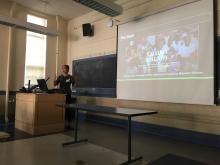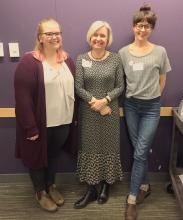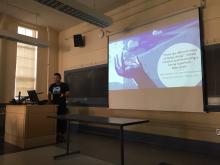In early May, the Harry Bridges Center for Labor Studies and the Department of Geography were pleased to present Taking Care: A Conference for Engaging the Politics, Processes, and Ethics of Care Work. This two-day gathering featured scholars primarily from around the Pacific Northwest and Canada and was organized by geography professor Kim England, the Harry Bridges Endowed Chair of Labor Studies, with graduate students Samantha Thompson and Caitlin Alcorn.
Having started the role as Harry Bridges Chair in the fall of 2018, England says she "had a unique opportunity to bring together graduate students from geography and elsewhere across campus" that she had met in her graduate seminar - GEOG 541 Feminist Geographies - as well as through the Bridges Center. Thompson, entering her second year in the Ph.D. program, was eager to help organize the conference, as she enjoys "organizing events like these because they offer excellent opportunities to bring people together who are asking important questions about topics that I care about, so that we, together, can think through ways that the discipline can be made better." Alcorn joined the organizing team upon her return from conducting field work with domestic workers in Brazil for her dissertation. By that time, says England, they had received "over twice the number of abstracts" than what they had anticipated, so they were glad for Alcorn's help! Together, they sorted the papers into a set of broadly cohesive, sequential sessions so that attendees could hear every presentation. Alcorn's dissertation is concerned with "expanding ideas of care as work" while Thompson focuses her research on "the role of care in housing advocacy and ways that housing justice and care can potentially intersect." For her part, England's scholarship "explores the globalization of care work, the experience of care workers and the ways these knit together the restructuring of care provision at the federal, state and local government levels with international migration and the home as a workplace."
According to Thompson, the conference approached the idea of care in many different ways: "from health and healthcare, to care and masculinities, to the many forms and impacts of care work" in the hopes that "attendees were able to take these many interdisciplinary approaches, understandings, and conceptualizations of care and apply them to their own work." Indeed, Alcorn was inspired and motivated by this dedicated space "for scholars to come together and advance theorizations on care in new directions." Dr. Kendra Strauss, Associate Professor and Director of the Labour Studies Program and The Morgan Centre for Labour Research at Simon Fraser University, discussed "social infrastructures of care in the global city" as both conference keynote and geography department colloquium speaker. England believes this was "a perfect kick-off for the conference," since "Kendra is a creative thinker whose research is always inter-disciplinary and deeply grounded in the materialities of daily life. In the past she has taken ‘big ideas’ like financialization and precarity and put them to work in the nitty-gritty of everyday life. At the conference, she showed that social infrastructure [the creation and maintenance of social services that support a good quality of life] has broad appeal and demonstrated the many ways it could be applied to care in all its facets."
England received feedback that attendees and presenters "valued being with scholars from other disciplines" while "[o]thers remarked that not only were the papers inspiring, ... they also liked having the space to rethink their own research in new ways." Star Murray, doctoral student in the UW Tacoma Program for Educational Leadership (Ed.D.), prepared a talk titled "Diversity, Equity, and Inclusion Decolonial Institute" that "provides a foundation for developing a collaboratively designed Diversity, Equity, and Inclusion Decolonial Institute (DEIDI) that will permanently sustain collective learning spaces that improve staff of color experiences [at a PWI]." Murray is "thankful ... to participate in care theory beyond a professionalized frame. People want to connect in their environment, through interactions, and in their research. The ways we frame a problem is important. We need to share in community dialogue in order to develop a community of learners who want to put their work into practice. From a critical race theory and equity lens, we must name the norms and systems of oppression that exist in educational practices and research."
Thompson also found that "... there are really exciting, expansive ways ... [of] moving care research forward in positive and necessary directions, including ways that care continues to be embedded within social hierarchies and processes of power, like those of race, colonialism, and gender. There is also work being done on care that extends our thinking to include ways that care can be thought of as a politics, a process, and a form of resistance against injustice. I was grateful for the opportunity to hear directly from people already doing this work and look forward to bringing these offered insights into my own research." England is excited for the role the conference has played in coalescing a research agenda around the theme of "engaging care" and for the programming developed by Andrew Hedden and Yasmin Ahmed, the staff in the Bridges Center for Labor Studies. Check out the Engaging Care website for events and updates!


